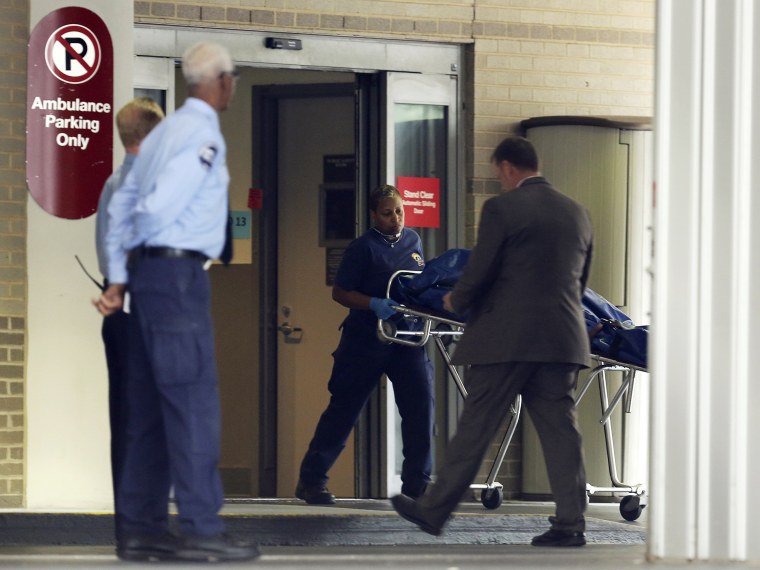The mass shooting at the Navy Yard in Washington D.C. on Monday, which left a dozen people dead, revitalized--at least momentarily--the dormant political debate over gun control.
It also set off what has become a familiar cycle: disbelief and outrage at the senseless bloodshed; expressions of solidarity from victims of previous shootings; grim comments from the president that this kind of thing is unacceptable.
If the past is a guide, what comes next is talk about strengthening gun safety laws, and ferocious--usually successful--opposition from the pro-gun lobby.
If the last year has shown anything, it's that mass shootings--whether the victims are children at a school or service personnel at a military base--don't change America's gun culture or its gun laws.
“We are confronting yet another mass shooting, and today it happened on a military installation of the nation’s capital,” said President Obama on Monday.
The suspected gunman, 34-year-old Aaron Alexis, is dead. Authorities said Alexis was "the single and sole person responsible" for the shooting. His motive was unknown.
Democratic Rep. Eleanor Holmes Norton of D.C. said her community has not had a day as tragic as Monday since the 9/11 terror attacks. “I hope that we all understand that with all these guns loose in the society, it does not take a terrorist to do what was done here today,” she said.
Dr. Janis Orlowski, the head doctor at MedStar Washington Hospital Center—which took in victims-- said there is “something evil in our society.”
“There’s something wrong here when we have these multiple shootings, these multiple injuries,” she said. “There is something wrong…I would like you to put my trauma center out of business,” She added, “I really would. I would like to not be an expert on gunshots and not to be an expert on this.”
Mark Glaze, the director of Mayors Against Illegal Guns, told MSNBC that other industrialized countries like the U.K. and Australia have much lower gun murder rates because “they make it harder for people who should not have guns to get guns and we make it extremely easy.”
Alexis arrived at the Navy Yard carrying a shotgun, which investigators say he bought last week at a gun dealer--Sharpshooters--in Lorton, Virginia, about 20 miles from Washington.
They believe he picked up two other weapons as he began the shooting spree, taking one from a police officer he shot. When he was killed, authorities recovered three weapons--the shotgun, a handgun, and an AR-15-style assault rifle.
Alexis had a troubled history, including several shooting incidents.
Glaze noted that “it’s entirely possible that no law would have changed” what happened in D.C. He added: “But that’s a false argument.” Tougher gun laws would certainly curtail some deadly shootings in some places.
But after each shooting, from Columbine to Tucson to Aurora to Sandy Hook, the national outrage and brief urgency quickly recede into complacency--or perhaps a sense of futility.
If anything, recent massacres have had the effect of calcifying the politics of gun control. After the Newtown massacre last year, which left 20 children dead, President Obama called for Congress to act. A bipartisan bill to expand background checks failed to become law when the Senate could not get the 60 votes it needed to overcome the threat of a GOP filibuster. Just last week in Colorado, voters ousted two state senators who had pushed for tougher gun control laws in the state.
After the Columbine shooting in 1999, then-Vice President Al Gore cast a tie-breaking vote in the Senate to strengthen background checks. The measure, however, was stalled in the House.
On Monday Captain Mark Kelly, husband of former Congresswoman Gabby Giffords of Arizona, who survived an assassination attempt in 2011, released a statement offering condolences to the family of victims.
The couple, who started pro gun control group Americans for Responsible Solutions added, “as proud members of the Navy family, we take note of the tragic fact that this terrible attack on men and women who dedicate themselves to keeping America safe did not occur in a war overseas -- but in a mass shooting here at home."
White House Press Secretary Jay Carney said on Monday that it was "far too early" to discuss if the latest shooting will catalyze new legislation to curb gun violence but that the president still hopes measures will be taken.
"The president supports, as do an overwhelming majority of Americans, common-sense measures to reduce gun violence," said Carney.
The NRA has not yet commented on the massacre.
